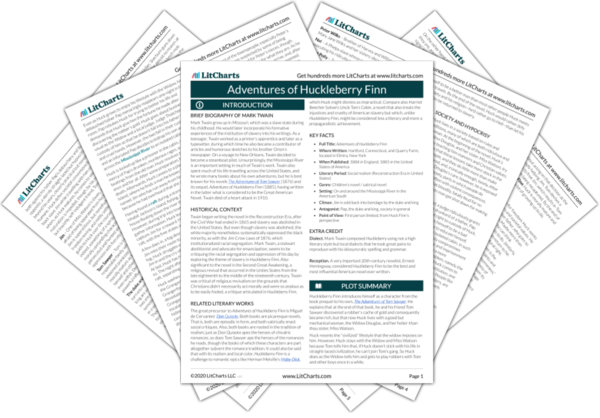Huck lives in a society based on rules and traditions, many of which are both ridiculous and inhuman. At the beginning of the novel, Huck’s guardian, the Widow Douglas, and her sister, Miss Watson, try to “sivilize” Huck by teaching him manners and Christian values, but Huck recognizes that these lessons take more stock in the dead than in living people, and they do little more than make him uncomfortable, bored, and, ironically enough, lonely. After Huck leaves the Widow Douglas’s care, however, he is exposed to even darker parts of society, parts in which people do ridiculous, illogical things, often with violent consequences. Huck meets good families that bloodily, fatally feud for no reason. He witnesses a drunken man get shot down for making a petty insult.
Even at the beginning of the novel, a judge ridiculously grants custody of Huck to Huck’s abusive drunkard of a father, Pap. The judge claims that Pap has a legal right to custody of Huck, yet, regardless of his right, Pap proves himself to be a bad guardian, denying Huck an opportunity to educate himself, beating Huck, and imprisoning him in an isolated cabin. In such a case, fulfilling Pap’s legal right ridiculously compromises Huck’s welfare. Furthermore, Huck’s abuse and imprisonment at the hands of Pap is implicitly compared to a more widespread and deeply engrained societal problem, namely the institutionalized enslavement of black people. Huck comes to recognize slavery as an oppressively inhuman institution, one that no truly “sivilized” society can be founded on. People like Sally Phelps, who seem good yet are racist slaveholders, are maybe the biggest hypocrites Huck meets on his travels.
Society and Hypocrisy ThemeTracker

Society and Hypocrisy Quotes in Adventures of Huckleberry Finn
You don’t know about me, without you have read a book by the name of “The Adventures of Tom Sawyer,” but that ain’t no matter. That book was made by Mr. Mark Twain, and he told the truth, mainly. There was things which he stretched, but mainly he told the truth.

Unlock explanations and citation info for this and every other Adventures of Huckleberry Finn quote.
Plus so much more...
Get LitCharts A+The Widow Douglas, she took me for her son, and allowed she would sivilize me; but it was rough living in the house all the time, considering how dismal regular and decent the widow was in all her ways; and so when I couldn’t stand it no longer, I lit out.
I went and told the Widow about it, and she said the thing a body could get by praying for it was “spiritual gifts.” This was too much for me, but she told me what she means—I must help others, and do everything I could for other people, and look out for them all the time, and never think about myself…but I couldn’t see no advantage about it—except for the other people—so at last I reckoned I wouldn’t worry about it any more, but just let it go.
“And looky here—you drop that school, you hear? I’ll learn people to bring up a boy to put on airs over his own father and let on to be better’n what he is.”
The judge he felt kind of sore. He said he reckoned a body could reform the ole man [Pap] with a shot-gun maybe, but he didn’t know no other way.
“When they told me there was a State in this country where they’d let that nigger vote, I drawed out. I says I’ll never vote again…I says to the people, why ain’t this nigger put up at auction and sold?”
“Yes—en I’s rich now come to look at it. I owns myself, en I’s wuth eight hund’d dollars. I wisht I had de money, I wouldn’ want no mo’.”
“I’m unfavorable to killin’ a man as long as you can git around it; it ain’t good sense, it ain’t good morals.”
Jim said it made him all over trembly and feverish to be so close to freedom. Well, I can tell you it made me all over trembly and feverish, too, to hear him, because I begun to get it through my head that he was most free—and who was to blame for it? Why, me.
So I reckoned I wouldn’t bother no more about [right and wrong], but after this always do whichever comes handiest at the time.
“Did you want to kill [the Shepherdson], Buck?”
“Well, I bet I did.”
“What did he do to you?”
“Him? He never done nothing to me.”
“Well, then, what did you want to kill him for?”
“Why nothing—only it’s on account of the feud.”
For what you want, above all things, on a raft, is for everybody to be satisfied, and feel right and kind towards others.
“I doan’ mine one er two kings, but dat’s enough. Dis one’s powerful drunk, en de duke ain’ much better.”
“The pitifulest thing out is a mob; that’s what an army is—a mob; they don’t fight with courage that’s born in them, but with courage that’s borrowed from their mass, and from their officers. But a mob without any man at the head of it, is beneath pitifulness.”
I do believe [Jim] cared just as much for his people as white folks does for their’n. It don’t seem natural, but I reckon it’s so.
I was sorry for them poor pitiful rascals, it seems like I couldn’t ever feel any hardness against them any more in the world. It was a dreadful thing to see. Human beings can be awful cruel to one another.
But I reckon I got to light out for the Territory ahead of the rest, because Aunt Sally she’s going to adopt me and sivilize me and I can’t stand it. I been there before.











